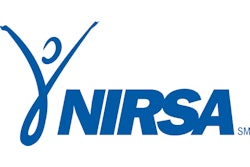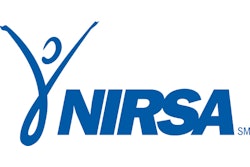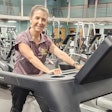
You don't have to look hard to find former college recreation student employees succeeding in today's diverse workforce. From wellness managers to sales managers, young professionals are bringing the skills they sharpened at their campus recreation centers to their burgeoning careers.
Historically, campus recreation has been one of the largest on-campus employers of students — even though only a fraction of them wind up working in campus rec after graduation. Few other student-employment opportunities offer such a broad range of on-the-job training. Students learn how to work in a team structure, make key decisions, solve problems, pay attention to details, plan events, verbally communicate with peers and superiors, organize and prioritize tasks, analyze quantitative data, obtain and process information, create and edit written reports, and influence others.
Research from the National Association of Colleges and Employers shows significant gaps between the skills employers seek in recent graduates and the skills graduates feel they are bringing to their chosen profession. Campus recreation student staff jobs help bridge that gap.
"Students are starting to understand that the skills they learn here are really valuable for employment beyond the university," Leah Hall Dorothy, director of recreational sports at Oregon State University and past president of NIRSA's Board of Directors, told Athletic Business in 2019. "A lot of our students are not pursuing recreation as a degree, so what they learn here really doesn't do any good unless they can actually articulate what they are doing and explain their transferrable skills to an employer. It shouldn't just be, 'Oh, I taught a fitness class,' or, 'I organized this group.' People are taking the skills they learn in campus recreation and finding their passions."
Just ask Kimmi Rasky, a physical health and wellness manager for the Wounded Warrior Project who oversees the organization's wellness programming in the Northeast.
"The experiences I was provided in campus rec really showed me exactly what I wanted to do with my career," she says. "Once I did my internship at UCLA [as a FITWELL coordinator], I had my eyes completely open to the world of wellness programming, and that is when I knew I wanted to move from the fitness world to the health and wellness world and work for a special population."
Rasky was a graduate assistant for fitness at the University of Mississippi's Turner Center from 2013 to 2015 before graduating with a master's degree in health promotion. She now works with six specialists, helping connect wounded veterans to wellness education and other programs in their communities.
"Every position I held within campus rec provided me the opportunity to be a leader or a manager," she says. "Those experiences gave me a much-needed head start in the job market."
Pro tips
Campus recreation jobs have given countless college grads a head start, regardless of their chosen profession.
"It taught me that you have to be driven to succeed," says Cody Schroeder, who was a graduate assistant for sport clubs at the University of Florida from 2009 to 2011 and is now a territory sales manager in Texas for Pennsylvania-based Victaulic, a manufacturer of couplings, valves and fittings for piping systems. "Through my work in campus rec, I learned how to take initiative when it came to problem-solving. I learned to present solutions — not problems — or to simply deal with issues on my own, if I was equipped to do so. It also helped me refine my soft skills. All of those things come into play on a daily basis at work and in life."
Schroeder considers himself fortunate enough to have worked for campus recreation departments at two universities that "really empowered their student staff members." Prior to attending Florida for his master's degree in sport management, Schroeder attended Texas A&M University to earn a bachelor's degree in sports management with a business minor.
"As a student, it's a great environment to work in," he says when asked for advice he'd offer to college students considering job opportunities at their campus recreation centers. "Professional staff members understand you're a student, and they are dedicated to your development and success."
Marlene Nichols enjoyed her time working at a university as a student so much that she joined the ranks after graduating from Texas A&M in 2012 with a master's degree in sports management.
"Campus recreation has taught me more than I can explain," says Nichols, who served as a graduate assistant for sport clubs from 2010 to 2012 and also interned in Texas A&M's Rec Sports marketing department. Today, she is an executive assistant for the Office of the Dean at Texas A&M's College of Medicine, where her responsibilities include overseeing calendar and event management, as well as recruiting, hiring, training and evaluating full-time and student employees. "No matter which job I have been in [post-graduation], the focus on my employees has always been No. 1, and this was learned through the experiences I had with student development in campus rec. I constantly challenge my employees to think outside the box and empower them to make their own data-driven decisions. This has allowed for a stronger team environment and trust with my staff."
Nichols also practices what she preaches, reminding herself to "take a step back after a large project is complete or a difficult conversation occurred to determine how I can improve for the future."
Teamwork and travel
Despite the skills they help develop, campus recreation jobs aren't all about work. (This is campus recreation, after all.) When asked to share the fondest memories from their campus rec days, Rasky, Schroeder and Nichols had plenty of options.
"It's not one specific thing," Schroeder says. "It's playing lunch league basketball with students and staff members, having deep conversations in your director's office, road-tripping to NIRSA conferences, and pulling off successful events or new programs with your staff. I was fortunate to work with some great people at both Texas A&M and the University of Florida."
For Nichols, the traveling opportunities stand out. "Experiencing the world of conferences is something I miss," she says. "It was just so great being able to see everyone once or twice a year at conferences or tournaments and exchange ideas. One conference that comes to mind was a regional conference in 2010, with a student portion tacked on to the beginning. It was my first time giving a presentation at a conference, and it was amazing to be able to collaborate with colleagues from other institutions on the presentation."
"It's very difficult to narrow it down," Rasky adds. "Serving on NIRSA's Student Leadership Team [a group of students involved with collaboration, student advocacy and leadership] and traveling the country is something I will forever be grateful for. That team had an awesome bond and so much drive. We really worked for students and felt an immense amount of passion that not everyone gets the opportunity to feel."
There's another perk, too. "As corny as it may sound," Rasky adds, "campus rec is the reason I met my husband and some of my greatest friends."
The Next Generation of Campus RecNIRSA and Athletic Business believe that current students have a fresh perspective on the industry, and we are giving them a platform to share their insights and experiences working in the field. In each regular issue of AB, we'll feature one student essay as part of our commitment to nurturing the future generation of campus recreation professionals. |
This article originally appeared in the January | February 2021 issue of Athletic Business with the title "Building Skills, Making Memories: Post-grad success stories." Athletic Business is a free magazine for professionals in the athletic, fitness and recreation industry. Click here to subscribe.





































